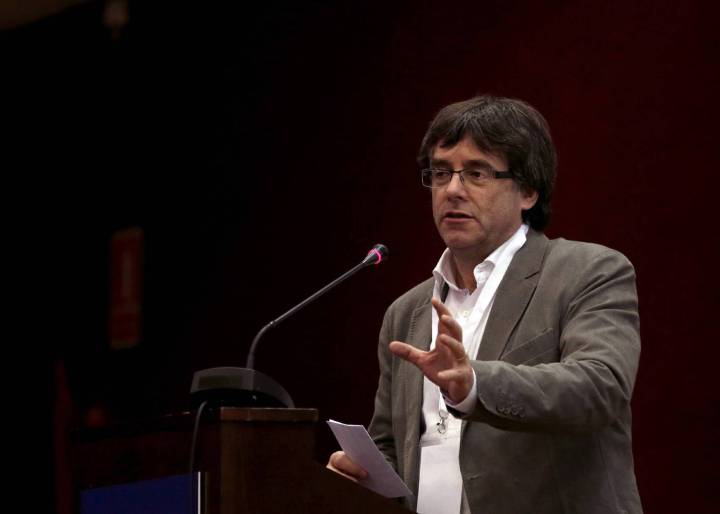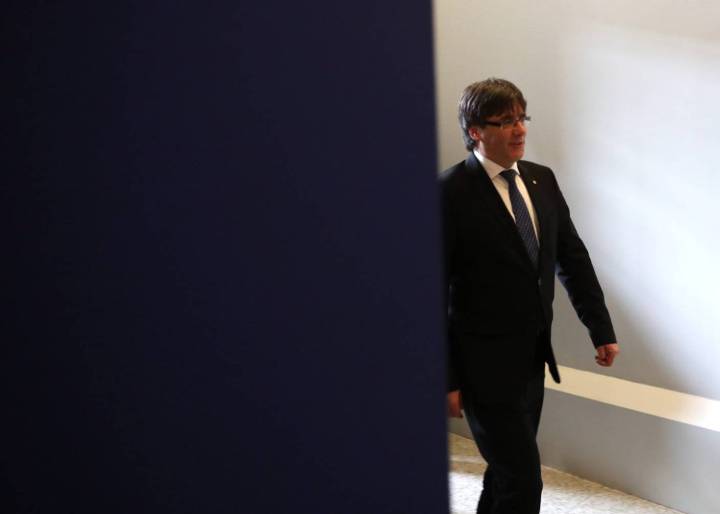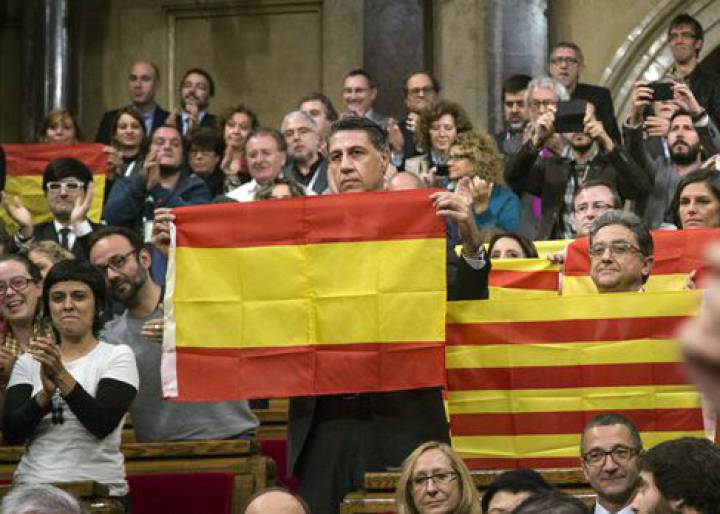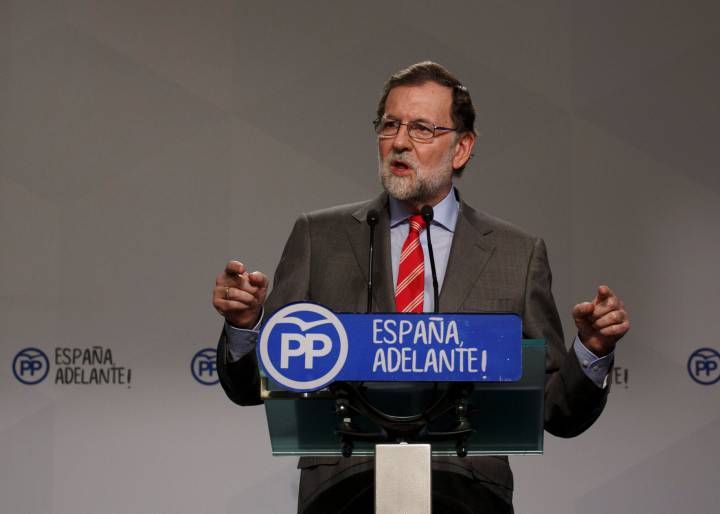Over 60% of Catalans reject unilateral declaration of independence
But figure rises to 67% if process were to take place without full parliamentary debate
Barcelona
The regional government of Catalonia says in a document the details of which were published by EL PAÍS on Monday that it will declare unilateral independence if it is prevented from holding a referendum on sovereignty. But a poll commissioned by EL PAÍS shows that only 35% of Catalans support this option, with 61% rejecting it outright. Furthermore, 67% of voters in the northeastern region are opposed to unilateral independence without any kind of debate in the Catalan regional parliament.
A march in favor of Catalan independence in 2016. CONSUELO BAUTISTA
Unilateral secession from Spain has steadily been embraced by most of Catalonia’s pro-independence parties in the face of the refusal by the central government in Madrid and the courts to allow the region to hold a referendum on sovereignty, whether merely consultative or binding.
The option was initially supported only by the Republican Left of Catalonia Party (ERC) and the left-wing CUP, but the center-right Catalan European Democratic Party (PDeCAT) – the successor to the Democratic Convergence of Catalonia, led by regional premier Carles Puigdemont – now supports it and wants a law approving it passed this summer in the Catalan regional parliament.
Around 60% of Catalans say they are “worried” about the future of their region
A unilateral declaration of independence is supported only by voters of pro-independence parties in the region, with 29% of PDeCat supporters against it, and 21% of ERC and CUP voters opposing the move.
In contrast, one in four voters of Catalunya Sí que es Pot, a coalition that includes anti-austerity party Podemos, supports unilateral independence, the EL PAÍS poll shows.
An even greater number of voters, 67%, reject the efforts of the government of Puigdemont, supported by CUP, to change procedural rules in the Catalan parliament to allow the draft bill on unilateral independence to be pushed through with minimal debate and no possibility of amendments. Deputies in the regional parliament would be given just a few hours to read the bill before voting on such fundamental questions as the organizational structure of a future Catalan state and language rights.
The EL PAÍS poll, carried out by Metroscopia, suggests that the sovereignty process being pushed by the Catalan regional government is losing momentum ahead of the proposed sovereignty referendum in late September. Disputes within the parties driving the secession process, along with upcoming trials of a number of some of their leaders, are undermining morale among wide sections of the Catalan electorate. Two out of three Catalans, or 66%, believe the process is not going well and only one in three, 34%, believe that independence is close to reality, down from 43% in 2014.
There is now a growing sense of fatigue within the pro-independence community
Over the last five years since moderate nationalists embraced independence and set a course toward a referendum, as well as accepting the idea of unilateral secession, there is now a growing sense of fatigue within the pro-independence community, reflected by the dwindling numbers of people prepared to protest against the court cases brought against some Catalan nationalists.
The Metroscopia poll shows that 62% of Catalans say they are “worried” about the future of their region, compared to 31%, who say they are “excited.” That 31-point difference is double that of July 2015, shortly before the regional elections that swept the pro-independence parties to power.
Since then, there has been constant fighting with the government of Prime Minister Mariano Rajoy in Madrid, first between former regional premier Artur Mas, and now his predecessor Puigdemont and his Republican Left deputy leader Oriol Junqueras, supported by the radical left of CUP.
At the same time, the Catalan regional government has faced serious internal problems, with spats between Republican Left and PDeCat deputies over organizing a referendum, as well as conflicts with CUP in the regional parliament over the budget.
And then there are the court cases against Mas, his right hand man Francesc Homs and others over the non-binding informal referendum held in November 2014 that produced a vote in favor of a breakaway from the rest of Spain.
CATALAN UNILATERAL SECESSION: “WORTHY OF THE WORST DICTATORSHIP”
FERNANDO GAREA
At its next plenary session, the Spanish Congress is to debate a motion presented by PDeCaT, the Catalan pro-independence party that heads the government in the northeastern region, on an independence referendum for Catalonia. Deputies in Congress, led by the ruling Popular Party, the Socialists (PSOE) and Ciudadanos, are expected to reject the proposal. In principle, none of these three groups supports any further congressional initiatives on Catalan independence, unless Carles Puigdemont, the Catalan regional premier, is prepared to appear before deputies.
The PP says there are no plans for Congress to debate independence for Catalonia in the foreseeable future unless or until the regional parliament of Catalonia itself approves changes to the law, which it would then present to Congress, as happened in 2005, when the Basque regional parliament approved changing the law on its status within Spain. In such a case, Puigdemont could debate the motion at a plenary session of Congress.
The PP’s spokesman, Rafael Hernando, said that Puigdemont could be asked to appear before Congress’s Constitutional Committee, although he is not obliged to do so, after which “a format could be found.”
Speaking on Tuesday in Senate in response to a question by the Republican Left on his willingness to allow an independence referendum, Prime Minister Mariano Rajoy resorted to his traditional line that a referendum is beyond his powers and would be anti-constitutional, describing Catalan regional premier Carles Puigdemont’s proposal for unilateral secession as “worthy of the worst dictatorship, and Spain, for the moment, is a democracy, and we are going to preserve that.”
Rajoy repeated his “willingness and obligation” since taking office 2011 to “resolve problems rather than create them,” accusing Puigdemont and the regional government of Catalonia of refusing to talk and that “a head of government cannot accept blackmail.”
English version by Nick Lyne.









































No hay comentarios:
Publicar un comentario